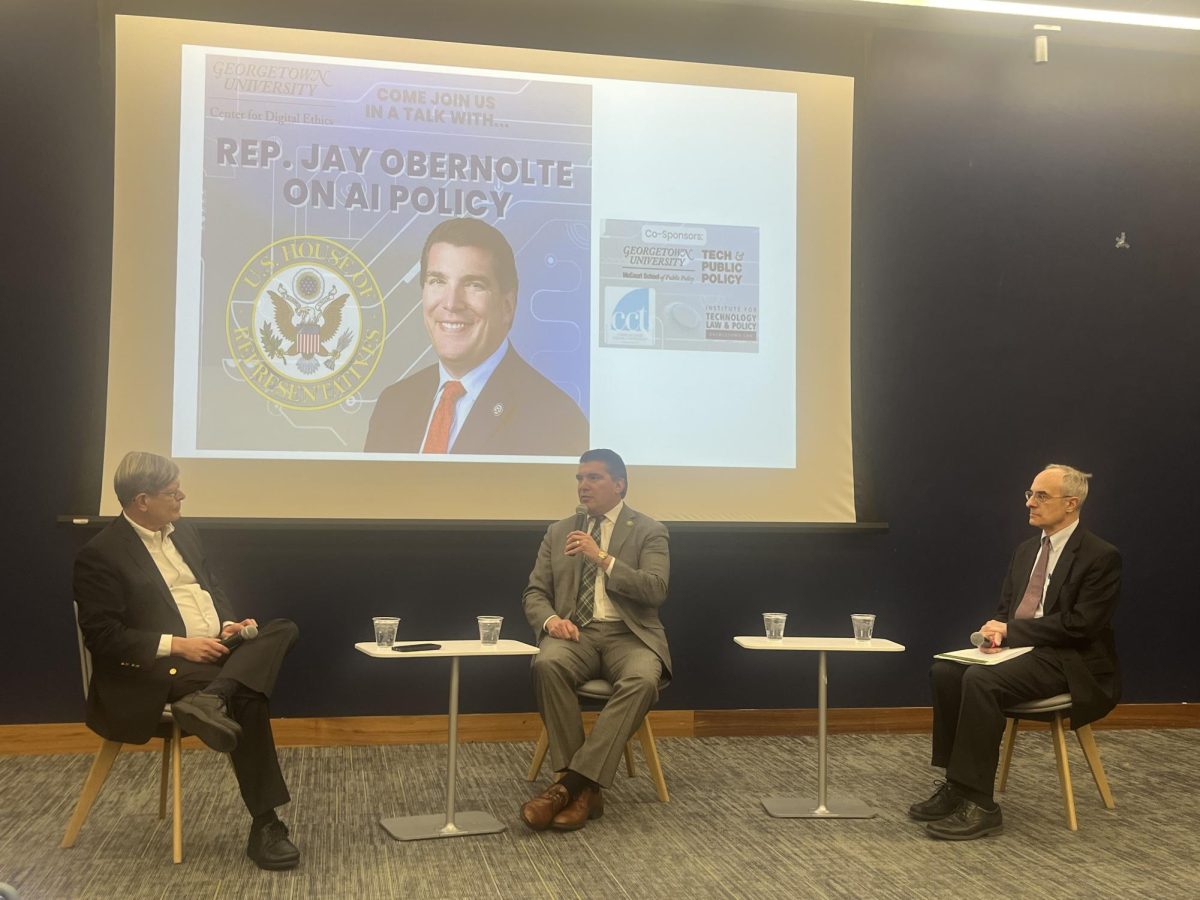
ISABEL LIU/THE HOYA | Rep. Jay Obernolte (R-Calif.) came to Georgetown for a discussion on artificial intelligence policy Feb. 10.
Georgetown University’s Center for Digital Ethics, a center that addresses the ethical implications of emerging technologies through research, teaching and service, invited Rep. Jay Obernolte (R-Calif.) for a discussion on artificial intelligence (AI) policy Feb. 10.
At the event, Obernolte urged the U.S. Congress to strengthen existing sectoral regulators and prioritize nonpartisanship in AI. Sectoral regulators are independent authorities with sector-specific responsibilities, such as the U.S. Food and Drug Administration (FDA).
Obernolte said existing laws already allow for AI regulation in contextualized scenarios, contrary to public perception.
“If you go through those negative outcomes, we already have laws that make the malicious use of AI illegal,” Obernolte said at the event. “They don’t specifically say AI. For example, the use of AI to steal someone’s money is already illegal. We don’t need to pass a law to do that.”
Iverson Yue (GRD ’27), a graduate student in the communication, culture and technology program, said AI regulation should build on existing laws.
“One thing I really agree with is that we are regulating the use of AI instead of the model of AI, because it really depends on how you use it,” Yue told The Hoya. “The Congressman also said now we are using general purpose AI, which has different applications for the use of AI, so it’s really hard to merely focus on the model.”
Obernolte said there are, however, cases that require specialized AI legislation, such as when AI inadvertently perpetuates systemic inequities due to biases in model training data.
“There was a well-publicized case several years ago where a company used AI to develop an algorithm to automate the screening of resumes, and this was kind of early days for the deployment of AI,” Obernolte said. “Now, with the benefit of hindsight, we would recognize that as what we call a highly consequential decision-making process, which means that it deserves a lot of extra scrutiny because of the impact that automated decision will have on people’s lives.”
Along with Rep. Ted Lieu (D-Calif.), Obernolte co-chaired the 118th Congress’ House Task Force on AI. The group published its final report in December 2024, which includes recommendations for Congress to encourage AI innovation while considering safeguards.
Obernolte said the task force shows how politicians across the aisle can collaborate on AI policy.
“We tried really hard to prevent people from reflexively retreating to their partisan corners,” Obernolte said.
Obernolte said studios’ promise not to use AI to replace or edit scripts written by a human writer in response to the Writers Guild of America’s strike in 2023 was misguided. He added that the choice between preserving human jobs or integrating AI into the workforce is a false dichotomy.
“I think it’s very short-sighted of them, because they did this out of the fear and belief that the use of AI will result in fewer jobs for scriptwriters,” Obernolte said.
Ariel Nochez, a junior at Washington University in St. Louis and an event attendee, said he is skeptical of Obernolte’s claim.
“In an ideal world, we would see AI being used as a tool along with the scriptwriters, but what we saw, at least from my knowledge, was AI not being used as a tool but rather replacing the actual screenwriters,” Nochez told The Hoya.
Yue said disparities in AI literacy prevent people from leveraging it as a tool to enhance the quality of their work.
“The presumption of that opinion is built upon that everyone has the knowledge to learn how to use AI, but the fact is that we can see even now that there are a lot of people who cannot even learn how to use social media or smartphones, so how can you expect everyone to take advantage of AI?” Yue said.
Nochez said bringing in experts with technical expertise can help bridge the gap between ideas and policy.
“Education and getting more technologists and people who’ve worked in that domain into Congress, contributing in some shape or form, that’s really good,” Nochez said.
Obernolte said it is crucial to pass AI policies that benefit everyone in the United States.
“This enhanced productivity will allow Americans from coast to coast to live better lives, to live more productive lives, and will also create this rising wave of prosperity that literally lifts all boats in America,” Obernolte said. “So that’s why it’s so important to get this right.”